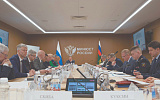Amid Moscow"s intense criticism of the United States for trying to modify the 1972 Anti-Ballistic Missile treaty and the Kremlin"s growing displeasure of Western meddling in its affairs over the conflict in Chechnya, Russia unveiled recently its new national security and military doctrines.
On October 5, 1999, the Defense Ministry and the Joint Staff submitted the sixth draft of the military doctrine to the National Security Council (NSC), and on the same day the advisory body adopted the national security blueprint.
The latter document, though approved almost two months ago, has remained largely unknown to the general public (its full text is first published in this (Russian-language) edition of the Independent Military Review).
But military analysts have been quick to point out numerous discrepancies between the two doctrines-a surprising fact, given that both documents were prepared by the defense ministry. The national security document says, for example, that ethnic conflicts in different Russian regions should be considered as the main threat to the national security. The military doctrine, however, puts them at the end of the list.
Military experts are already saying that the new national security doctrine has many of the shortfalls of the old one. Terminology is often unclear. Much, for instance, is said about the need to defend Russia"s vital interests, without clearly defining the term.
Nor is it clear what are the means of ensuring national security, or how one is to judge the effectiveness of the country"s defense strategy.
Some of the means proposed are broad generalities, such as "economic growth and socially oriented economic policies" (the document classifies further economic decline and the growing gap between Russia"s new elites and the impoverished masses as threats to national security).
The doctrine also advocates "effective control over hard currency flows and the need to prevent capital flight." But whether Russia"s finance ministry would be willing to take economics lessons from the generals is, however, at best uncertain.
The national security doctrine identifies the weakening of mechanisms of international collective security, such as the United Nations and the Organization for Security and Co-operation in Europe (OSCE), as one of the main threats to Russia.
So, it says, are NATO"s eastward expansion and further disintegration of the Commonwealth of Independent States (CIS).
In an obvious reference to NATO"s bombing of Yugoslavia this spring, the national security doctrine says that "such practices, bypassing the UN Security Council, can trigger off strategic destabilization."
The roar of NATO bombers over Yugoslavia was accompanied by uproar in Russia, which is yet to subside. Moscow's anger over what President Yeltsin called at the time the West's "naked aggression" against Belgrade has sent the temperature in an already cooling East-West relationship down towards Cold War depths.
Threats emanating this March from different ministerial offices in Moscow included the possible use of force, the arming of Belgrade in defiance of an international embargo, and pulling out of weapons and security agreements. The rattling of rusty Russian sabers caused concern in Western capitals but not enough to dissuade NATO governments from the course on which they had embarked.
Though unwilling to see their relations with Moscow suffer "collateral damage," they believed its rage to be impotent. If Yeltsin's impoverished and chaotic state is to win the loans it needs to pay its debts, it cannot match words with deeds.
Manifestations of rage over Kosovo were both popular and political. Nationalists in Moscow threw eggs and urinated on the steps of the U.S. embassy. Not for the first time, the Communist-dominated Duma postponed ratifying the 1993 Start 2 arms reduction treaty. Russia decided not to go to NATO"s 50th anniversary party in April, and Moscow"s NATO envoy was ordered home-only to return shortly after the Milosevic surrender.
Moscow's anger probably stemmed less from fellow-feeling for Serbia, historically a Slav "little brother", than from humiliation that the United Nations, the one international club where it sits at the top table, has been sidelined over Kosovo.
NATO did not seek explicit approval from the UN Security Council, partly because Russia, one of five permanent members, would have used its veto. A Security Council debate, called at Russia's insistence as the bombing started, was inevitably inconclusive; Kofi Annan, the secretary-general, diplomatically chided Belgrade for intransigence and NATO for failing to go through the council.
This fall, Russian military crackdown on Chechnya, a predominantly Muslim separatist region which had won a de facto independence after a brutal war in 1994-1995, offered Western governments a chance to repay Moscow in kind and accuse it of human rights abuses.
Television pictures in America and in Europe have depicted heart-rending scenes of Chechen babies injured by shrapnel in Russian air raids. The West has been warning Yeltsin that such images threaten to undermine Russia's international reputation as well as its goal of suppressing rebellion.
Similar warnings previously have prompted only angry denunciations by the Kremlin of western meddling in its affairs, however, and pressure is increasing on U.S. President Bill Clinton to sharpen his words with the threat of action. Critics of America's policy towards Russia are demanding economic sanctions, including the withholding of international loans.
In November, Western leaders met Russian President Boris Yeltsin in Turkey at a session of the Organization for Security and Co-operation in Europe and voiced anxieties about the slaughter of civilians in Chechnya.
The Clinton administration"s stated desire to modify the 1972 Anti-Ballistic Missile treaty, which Russia considers the foundation of nuclear arms control, has become another bone of contention between Moscow and Washington.
General Vladimir Yakovlev of Russia's Strategic Rocket Forces said recently that Russia would consider itself "freed from all arms control obligations" should the ABM Treaty be altered.
Russia tested Nov. 2 a short-range interceptor rocket for the Moscow anti-ballistic missile system in what appeared to be a symbolic warning to the United States not to go ahead with an expanded ABM system that is under consideration in Washington.
The test missile was not identified, but it is among those installed in the Moscow anti-ballistic missile system of radars and missiles built around the capital in the Soviet era. The 1972 Anti-Ballistic Missile (ABM) treaty allowed two such systems, and a subsequent protocol limited it to one.
The Moscow anti-ballistic missile system, known as A-135, includes the full complement of 100 interceptor missiles permitted by the treaty. The system is said to have a dual defense against ballistic missiles.
If the radars spot incoming missiles, Russia could launch up to 36 longer-range SH-11 Gorgon missiles. Should any missiles penetrate this layer, the system also has 64 short-range SH-08 Gazelle missiles, which are quick-reaction, high-acceleration interceptors.
The test-firing capped a string of recent warnings to the United States that Russia will oppose any major changes in the ABM treaty, which Presidents Clinton and Boris Yeltsin agreed earlier to discuss.
On the same day as the missile test Russian Prime Minister Vladimir Putin delivered a letter from Yeltsin to Clinton at a ceremony in Oslo. According to a Kremlin statement, Yeltsin called for "strict compliance" to the ABM treaty, and said that would be the best way to counter missile threats from other countries.
And one week after testing the interceptor rocket, Russia's Foreign Ministry said that talks on nuclear arms reduction could be scrapped if the United States doesn't stick to the letter and spirit of the 1972 ABM treaty.
"Russia is prepared to consider further reduction of strategic offensive weapons,'' Foreign Ministry spokesman Vladimir Rakhmanin was quoted as saying by the ITAR-Tass news agency Nov 10. "This includes cooperation in areas that ABM deals with, but only on condition that the ABM treaty remains in effect and is strictly complied with."
Russia has also threatened to prolong the life of multiple-warhead missiles outlawed by START II, and change the new single-warhead Topol-M missile to a multiple-warhead delivery vehicle.
The START II treaty, signed in 1993, has never been ratified by the Duma, Russian parliament"s lower chamber. The Communists and their allies, who have the majority in the Duma, don't like START II because they say it deprives Russia of its mainstay, multiple-warhead missiles while it lacks the money to match the United States by building new single-warhead missiles.
The United States is considering a national missile defense system (NMD) in response to what it perceives as threats from rogue states, such as North Korea, Iran or Iraq.
The Clinton administration has said it will make a decision next June on whether to build such a system, which initially would be based in Alaska and North Dakota.
The U.S. side has stressed on many occasions that the NMD system is far less ambitious than the aborted 'star wars' scheme that Democrats had been ridiculing for 15 years as a product of Ronald Reagan's Hollywood naivete and crude anti-communism.





























